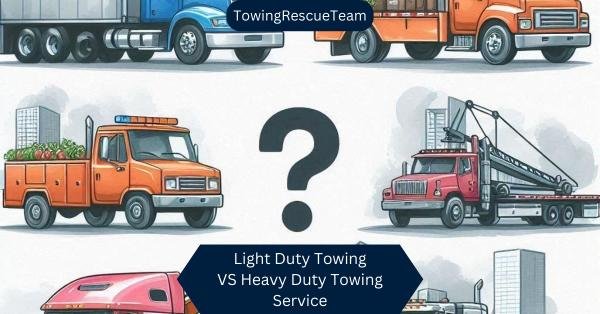When it comes to towing services understanding the difference between light-duty towing and heavy-duty towing is essential for you. Light-duty towing involves moving smaller vehicles like cars, SUVs, and light trucks that has weight range between 7,000 and 11,000 pounds. It is ideal for roadside assistance, vehicle recovery, and short-distance transport. On the other hand, heavy-duty towing is designed for much larger vehicles such as buses, semis, and heavy machinery, often weighing over 26,000 pounds. This type of towing requires special equipment and more complex procedures.
The key difference between the two lies in the size and weight of the vehicles they handle, the equipment used, and the complexity of the towing process. In this blog post, we’ll dive deeper into these distinctions to help you better understand which service you may need and how choosing the right option can ensure your vehicle is towed safely and efficiently.
Table of Contents
What is Light-Duty Towing Service?
Light-duty towing service is the towing service used to transport smaller vehicles and lighter loads. It is designed for everyday vehicles like sedans, small vans, and light trucks, which weigh between 2,600 and 3,000 pounds. These vehicles are handled by light-duty tow trucks, which have a capacity ranging from 7,000 to 11,000 pounds. Equipped with a Gross Vehicle Weight Rating (GVWR) of 8,500 to 10,000 pounds, light-duty tow trucks are highly maneuverable, especially in urban environments.
Light-duty towing is commonly used for tasks such as roadside assistance, vehicle recovery, and towing lighter vehicles. These services are ideal for handling common roadside issues like flat tires, engine failures, and minor accidents, offering a quick and efficient solution to get vehicles off the road and to a safe location.
What is Heavy-Duty Towing Service?
Heavy-duty towing service is a service designed to transport exceptionally large and heavy vehicles that has the weight over 26,000 pounds. This type of towing is necessary for vehicles such as buses, tractor-trailers, garbage trucks, and large RVs. Heavy-duty tow trucks are equipped with powerful machinery capable of handling substantial loads with towing capacities ranging from 20,000 to over 140,000 pounds, depending on the equipment used.
Unlike light-duty towing, heavy-duty towing involves the use of more robust equipment, such as rotator tow trucks and heavy wreckers, which can handle the challenges of towing massive vehicles. These tow trucks are often equipped with advanced features, such as hydraulic systems and winches, to safely manage large vehicles in complex recovery situations, like overturned trucks or severe accidents.
The cost of heavy-duty towing varies based on several factors, including the distance traveled, the size and weight of the vehicle, and any additional services required. For local tows, the cost typically ranges from $150 to $300, while longer or more complex jobs can range from $200 to $500 per hour.
What is the Key Differences Between Light-Duty and Heavy-Duty Towing?
The key difference between the light duty and heavy duty towing is lie in the type of vehicles they handle, equipment used, and complexity of the towing process.
- Vehicle Size and Weight
Light-duty towing is designed for smaller vehicles, such as cars, SUVs, and light trucks, typically weighing between 2,600 and 3,000 pounds. Heavy-duty towing, on the other hand, is meant for much larger vehicles like buses, semis, and construction equipment, often weighing over 26,000 pounds. - Equipment Used
The equipment for light-duty towing includes smaller tow trucks, such as those with a Gross Vehicle Weight Rating (GVWR) between 8,500 and 10,000 pounds. These trucks are agile and ideal for urban areas. Heavy-duty towing requires powerful equipment, including tow trucks with capacities ranging from 20,000 to over 140,000 pounds. These trucks are equipped with strong hydraulic systems and advanced towing mechanisms. - Complexity of the Job
Light-duty towing is typically straightforward and often involves roadside assistance or simple recoveries, such as moving a broken-down car. Heavy-duty towing, however, involves more complex operations, such as recovering overturned tractor-trailers or towing large machinery. These jobs require skilled operators and specialized tools, making them more challenging and time-consuming. - Cost
Light-duty towing usually costs between $50 and $250 per hour, depending on factors such as distance, time of day, and vehicle weight. Heavy-duty towing is more expensive due to the larger vehicles and specialized equipment involved, with local jobs ranging from $150 to $300, and more complex tasks costing up to $500 per hour.
Here’s a table that shows the key differences between heavy-duty towing and light-duty towing:
| Aspect | Light-Duty Towing | Heavy-Duty Towing |
|---|---|---|
| Vehicle Size and Weight | 7,000 to 11,000 lbs capacity | 20,000 to over 140,000 lbs capacity |
| Types of Vehicles | Sedans, small vans, light trucks (2,600 to 3,000 lbs) | Buses, tractor-trailers, large trucks, heavy machinery |
| Equipment Used | Smaller tow trucks (GVWR 8,500 to 10,000 lbs) | Heavy-duty trucks, rotators, wreckers with advanced tools |
| Typical Scenarios | Roadside assistance, vehicle recovery, towing lighter vehicles | Overturned trucks, large vehicle recovery, heavy machinery transport |
| Complexity of Job | Straightforward, quick recovery | Complex operations, requires specialized skills and tools |
| Cost Range | $50 to $250 per hour | $150 to $500 per hour depending on complexity |
How Towing Rescue Team Provides Both Heavy-Duty and Light-Duty Towing Services
Whether you’re dealing with a small sedan or a large commercial truck we have the expertise and equipment to get the job done. Our light-duty towing is perfect for everyday vehicles, while our heavy-duty towing can handle even the heaviest loads with ease. Whenever you need a reliable towing service, Towing Rescue Team is always there for you. Whatever the situation, we come and rescue you with our trained heavy-duty and light-duty towing services ensure you’re never left stranded.
